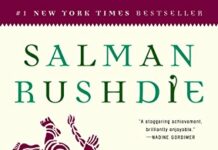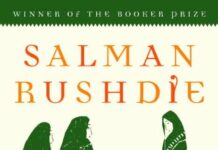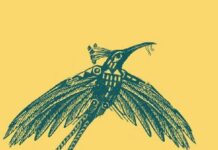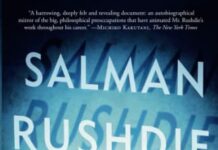
Ebook Info
- Published: 2011
- Number of pages: 240 pages
- Format: EPUB
- File Size: 2.01 MB
- Authors: Salman Rushdie
Description
“You’ve reached the age at which people in this family cross the border into the magical world. It’s your turn for an adventure—yes, it’s finally here!” So says Haroun to his younger brother, twelve-year-old Luka. The adventure begins one beautiful starry night in the land of Alifbay, when Luka’s father, Rashid, falls suddenly into a sleep so deep that nothing and no one can rouse him. To save him from slipping away entirely, Luka embarks on a journey through the world of magic with his loyal companions, Bear, the dog, and Dog, the bear. Together they encounter a slew of fantastical creatures, strange allies, and challenging obstacles along the way—all in the hope of stealing the Fire of Life, a seemingly impossible and exceedingly treacherous task.
User’s Reviews
Editorial Reviews: Review “A magical fable . . . nonstop fun.”—The Washington Post“A fantastic adventure tale.”—New York Post“Riddles, puns and other wordplay enliven the writing. . . . The charm and cleverness of this buoyant fantasy will draw you into its Magical World.”—Minneapolis Star Tribune “Smart and entertaining . . . should please children and adults alike.”—The Miami Herald“[Rushdie’s] exuberant wordplay is evident on every page.”—The New York Times Book Review NAMED ONE OF THE 10 BEST BOOKS OF THE YEAR BY THE HUFFINGTON POST NAMED ONE OF THE BEST BOOKS OF THE YEAR BYMaggie Galehouse, NPR • The Kansas City Star About the Author Salman Rushdie is the author of fourteen previous novels, including Midnight’s Children (for which he won the Booker Prize and the Best of the Booker), Shame, The Satanic Verses, The Moor’s Last Sigh, and Quichotte, all of which have been shortlisted for the Booker Prize; a collection of stories, East, West; a memoir, Joseph Anton; a work of reportage, The Jaguar Smile; and three collections of essays, most recently Languages of Truth. His many awards include the Whitbread Prize for Best Novel, which he won twice; the PEN/Allen Foundation Literary Service Award; the National Arts Award; the French Prix du Meilleur Livre Étranger; the European Union’s Aristeion Prize for Literature; the Budapest Grand Prize for Literature; and the Italian Premio Grinzane Cavour. He is a member of the American Academy of Arts and Letters and a fellow of the American Academy of Arts and Sciences, and he is a Distinguished Writer in Residence at New York University. He is a former president of PEN America. His books have been translated into over forty languages. Excerpt. © Reprinted by permission. All rights reserved. Chapter OneThe Terrible Thing ThatHappened on the Beautiful Starry NightThere was once, in the city of Kahani, in the land of Alifbay, a boy named Luka who had two pets, a bear named Dog and a dog named Bear, which meant that whenever he called out, “Dog!” the bear waddled up amiably on his hind legs, and when he shouted, “Bear!” the dog bounded toward him, wagging his tail. Dog, the brown bear, could be a little gruff and bearish at times, but he was an expert dancer, able to get up onto his hind legs and perform with subtlety and grace the waltz, the polka, the rhumba, the wah-watusi, and the twist, as well as dances from nearer home, the pounding bhangra, the twirling ghoomar (for which he wore a wide mirror-worked skirt), the warrior dances known as the spaw and the thang-ta, and the peacock dance of the south. Bear, the dog, was a chocolate Labrador, and a gentle, friendly dog, though sometimes a bit excitable and nervous; he absolutely could not dance, having, as the saying goes, four left feet, but to make up for his clumsiness he possessed the gift of perfect pitch, so he could sing up a storm, howling out the melodies of the most popular songs of the day, and never going out of tune. Bear, the dog, and Dog, the bear, quickly became much more than Luka’s pets. They turned into his closest allies and most loyal protectors, so fierce in his defense that nobody would ever have dreamed of bully_ing him when they were nearby, not even his appalling classmate Ratshit, whose behavior was usually out of control.This is how Luka came to have such unusual companions. One fine day when he was twelve years old, the circus came to town-and not just any circus, but the GROF, or Great Rings of Fire, itself; the most celebrated circus in all of Alifbay, “featuring the Famous Incredible Fire Illusion.” So Luka was at first bitterly disappointed when his father, the storyteller Rashid Khalifa, told him they would not be going to the show. “Unkind to animals,” Rashid explained. “Once it may have had its glory days but these days the GROF has fallen far from Grace.” The Lioness had tooth decay, Rashid told Luka, and the Tigress was blind and the Elephants were hungry and the rest of the circus menagerie was just plain miserable. The Ringmaster of the Great Rings of Fire was the terrifying and enormous Captain Aag, a.k.a. Grandmaster Flame. The animals were so scared of the crack of his whip that the Lioness with toothache and the blind Tigress continued to jump through hoops and play dead and the skinny Elephants still made Pachyderm Pyramids for fear of angering him, for Aag was a man who was quick to anger and slow to laugh. And even when he put his cigar-smoking head into the Lioness’s yawning mouth, she was too scared to bite it off just in case it decided to kill her from inside her belly.Rashid was walking Luka home from school, wearing, as usual, one of his brightly colored bush shirts (this one was vermilion) and his beloved, battered Panama hat, and listening to the story of Luka’s day. Luka had forgotten the name of the tip of South America and had labeled it “Hawaii” in a geography test. However, he had remembered the name of his country’s first president and spelled it correctly in a history test. He had been smacked on the side of the head by Ratshit’s hockey stick during games. On the other hand, he had scored two goals in the match and defeated his enemy’s team. He had also finally got the hang of snapping his fingers properly, so that they made a satisfying cracking noise. So there were pluses and minuses. Not a bad day overall; but it was about to become a very important day indeed, because this was the day they saw the circus parade going by on its way to raise its Big Top near the banks of the mighty Silsila. The Silsila was the wide, lazy, ugly river with mud-colored water that flowed through the city not far from their home. The sight of the droopy cockatoos in their cages and the sad dromedaries humphing along the street touched Luka’s generous young heart. But saddest of all, he thought, was the cage in which a mournful dog and a doleful bear stared wretchedly all about. Bringing up the rear of the cavalcade was Captain Aag with his pirate’s hard black eyes and his barbarian’s untamed beard. All of a sudden Luka became angry (and he was a boy who was slow to anger and quick to laugh). When Grandmaster Flame was right in front of him Luka shouted out at the top of his voice, “May your animals stop obeying your commands and your rings of fire eat up your stupid tent.”Now it so happened that the moment when Luka shouted out in anger was one of those rare instants when by some inexplicable accident all the noises of the universe fall silent at the same time, the cars stop honking, the scooters stop phut-phuttering, the birds stop squawking in the trees, and everyone stops talking at once, and in that magical hush Luka’s voice rang out as clearly as a gunshot, and his words expanded until they filled the sky, and perhaps even found their way to the invisible home of the Fates, who, according to some people, rule the world. Captain Aag winced as if somebody had slapped him on the face, and then he stared straight into Luka’s eyes, giving him a look of such blazing hatred that the young boy was almost knocked off his feet. Then the world started making its usual racket again, and the circus parade moved on, and Luka and Rashid went home for dinner. But Luka’s words were still out there in the air, doing their secret business.That night it was reported on the TV news that, in an astonishing development, the animals of the GROF circus had unanimously refused to perform. In a crowded tent, and to the amazement of costumed clowns and plainclothes customers alike, they rebelled against their master in an unprecedented act of defiance. Grandmaster Flame stood in the center ring of the three Great Rings of Fire, bellowing orders and cracking his whip, but when he saw all the animals beginning to walk calmly and slowly to_ward him, in step, as if they were an army, closing in on him from all directions until they formed an animal circle of rage, his nerve cracked and he fell to his knees, weeping and whimpering and begging for his life. The audience began to boo and throw fruit and cushions, and then har_der objects, stones, for example, and walnuts, and telephone directories. Aag turned and fled. The animals parted ranks and let him through, and he ran away crying like a baby.That was the first amazing thing. The second took place later that night. A noise started up around midnight, a noise like the rustling and crackling of a billion autumn leaves, or maybe even a billion billion, a noise that spread all the way from the Big Top by the banks of the Silsila to Luka’s bedroom, and woke him up. When he looked out his bedroom window he saw that the great tent was on fire, burning brightly in the field by the river’s edge. The Great Rings of Fire were ablaze; and it was not an illusion.Luka’s curse had worked.The third amazing thing happened the next morning. A dog with a tag on its collar reading “Bear” and a bear with a tag on its collar reading “Dog” showed up at Luka’s door-afterward Luka would wonder exactly how they had found their way there-and Dog, the bear, began to twirl and jig enthusiastically while Bear, the dog, yowled out a foot-tapping melody. Luka and his father, Rashid Khalifa, and his mother, Soraya, and his older brother, Haroun, gathered at the door of their house to watch, while from her verandah their neighbor Miss Oneeta shouted, “Have a care! When animals begin to sing and dance, then plainly some witchy business is afoot!” But Soraya Khalifa laughed. “The animals are celebrating their freedom,” she said. Then Rashid adopted a grave expression, and told his wife about Luka’s curse. “It seems to me,” he opined, “that if any witchy business has been done it is our young Luka who has done it, and these good creatures have come to thank him.”The other circus animals had escaped into the Wild and were never seen again, but the dog and the bear had plainly come to stay. They had even brought their own snacks. The bear was carrying a bucket of fish, and the dog wore a little coat with a pocket full of bones. “Why not, after all?” cried Rashid Khalifa gaily. “My storytelling performances could do with a little help. Nothing like a dog-and-bear song-and-dance act to get an audience’s attention.” So it was settled, and later that day it was Luka’s brother, Haroun, who had the last word. “I knew it would happen soon,” he said. “You’ve reached the age at which people in this family cross the border into the magical world. It’s your turn for an adventure-yes, it’s finally here!-and it certainly looks like you’ve started something now. But be careful. Cursing is a dangerous power. I was never able to do anything so, well, dark.””An adventure of my very own,” Luka thought in wonderment, and his big brother smiled, because he knew perfectly well about Luka’s Secret Jealousy, which was actually Not So Secret At All. When Haroun had been Luka’s age he had traveled to the Earth’s second moon, befriended fishes who spoke in rhyme and a gardener made of lotus roots, and helped to overthrow the evil Cultmaster Khattam-Shud, who was trying to destroy the Sea of Stories itself. By contrast, Luka’s biggest adventures to date had taken place during the Great Playground Wars at school, in which he had led his gang, the Intergalactic Penguins Team, to a famous victory over the Imperial Highness Army led by his hated rival Adi Ratshit, a.k.a. Red Bottom, winning the day with a daring aerial attack involving paper planes loaded with itching powder. It had been extremely satisfying to watch Ratshit jump into the playground pond to calm down the itch that had spread all over his body; but Luka knew that, compared to Haroun’s achievements, his really didn’t amount to very much at all. Haroun, for his part, knew about Luka’s desire for a real adventure, preferably one involving improbable creatures, travel to other planets (or at least satellites), and P2C2Es, or Processes Too Complicated to Explain. But until now he had always tried to damp down Luka’s lusts. “Be careful what you wish for,” he told Luka, who replied, “To be honest with you, that is easily the most annoying thing you have ever said.”In general, however, the two brothers, Haroun, and Luka, rarely quarreled and, in fact, got on unusually well. An eighteen-year age gap had turned out to be a good place to dump most of the problems that can sometimes crop up between brothers, all those little irritations that make the older brother accidentally knock the kid’s head against a stone wall or put a pillow over his sleeping face by mistake; or persuade the younger brother that it’s a good idea to fill the big fellow’s shoes with sweet, sticky mango pickle, or to call the big guy’s new girlfriend by a different girlfriend’s name and then pretend it was just a really unfortunate slip of the tongue. So none of that happened. Instead Haroun taught his younger brother many useful things, kickboxing, for example, and the rules of cricket, and what music was cool and what was not; and Luka uncomplicatedly adored his older brother, and thought he looked like a big bear-a bit like Dog, the bear, in fact-or, perhaps, like a comfortable stubbly mountain with a wide grin near the top.Luka had first amazed people just by getting born, because his brother, Haroun, was already eighteen years old when his mother, Soraya, at the age of forty-one gave birth to a second fine young boy. Her husband, Rashid, was lost for words, and so, as usual, found far too many of them. In Soraya’s hospital ward he picked up his newborn son, cradled him gently in his arms, and peppered him with unreasonable questions. “Who’d have thought it? Where did you come from, buster? How did you get here? What do you have to say for yourself? What’s your name? What will you grow up to be? What is it you want?” He had a question for Soraya, too. “At our age,” he marveled, shaking his balding head. “What’s the meaning of a wonder like this?” Rashid was fifty years old when Luka arrived, but at that moment he sounded like any young, greenhorn father flummoxed by the arrival of responsibility, and even a little scared.Soraya took the baby back and calmed its father down. “His name is Luka,” she said, “and the meaning of the wonder is that we appear to have brought into the world a fellow who can turn back Time itself, make it flow the wrong way, and make us young again.”Soraya knew what she was talking about. As Luka grew older, his parents seemed to get younger. When baby Luka sat up straight for the first time, for example, his parents became incapable of sitting still. When he began to crawl, they hopped up and down like excited rabbits. When he walked, they jumped for joy. And when he spoke for the first time-well!-you’d have thought the whole of the legendary Torrent of Words had started gushing out of Rashid’s mouth, and he was never going to stop spouting on about his son’s great achievement.The Torrent of Words, by the way, thunders down from the Sea of Stories into the Lake of Wisdom, whose waters are illumined by the Dawn of Days, and out of which flows the River of Time. The Lake of Wisdom, as is well known, stands in the shadow of the Mountain of Knowledge, at whose summit burns the Fire of Life. This important information regarding the layout-and, in fact, the very existence-of the Magical World was kept hidden for thousands of years, guarded by mysterious, cloaked spoilsports who called themselves the Aalim, or Learned Ones. However, the secret was out now. It had been made available to the general public by Rashid Khalifa in many celebrated tales. So everyone in Kahani was fully aware that there was a World of Magic existing in parallel with our own non-Magic one, and from that Reality came White Magic, Black Magic, dreams, nightmares, stories, lies, dragons, fairies, blue-bearded genies, mechanical mind-reading birds, buried treasure, music, fiction, hope, fear, the gift of eternal life, the angel of death, the angel of love, interruptions, jokes, good ideas, rotten ideas, happy endings, in fact almost everything of any interest at all. Read more
Reviews from Amazon users which were colected at the time this book was published on the website:
⭐It has been over two decades since I have read Haroun and the Sea of Stories, but its beautiful imagery and wordplay remains with me. When I came to Luka and the Fire of Life, I chose to read it to my youngest son (7). The playful language of Rushdie entertained him and he would hook onto little things like King Solomon’s Flying Carpet and names of characters like Ratshit, Bear the dog, Dog the Bear, and Capitan Aag with the enthusiasm of a seven-year-old. The story itself involved grand adventures to save a father and his world of stories by scaling the Mountain of Knowledge to find the Fire of Life. He needed to battle authority after authority to find life. His greatest ally was the Queen of disrespect, the Insultana of Ott. These battles culminate in a happy ending where the Shah of Blah is saved from certain death. The journey there fills you with amusement and sentimentality over the passing away of our worlds. Rushdie tries to reconcile us with our mortal fate, and I found his effort noble. That nobility made Luka and the Fire of Life a triumph on this side of the vale of tears, and we should be grateful for such poetry. He offers this salve for mortality in a story that engages a young mind with a range of some of the most engaging myths of human history.
⭐Salman Rushdie’s “Luka and Fire of Life” has simple story line. Luka is a twelve year, left handed boy who excels at video games who saves his father’s (The Shah of Blah) life via an alternative reality. While reading this book I kept thinking what a wonderful video game this would make and how educational it would be with all the ancient Gods and Goddesses from all over the world.Also included in this delicious little world are flying/swimmin elephants who do not forget anything, a Queen of Otter the Insultana Soroya who flies Solomon’s flying carpet. Also there is the ghost image of Luka’s father who travels with Luka on this journey-whose best interest does this Nobodaddy have at heart.There is also a delicious dictatorship of Rats that the sassy Insultana Soroya loves to attack. The rats represent order while Soroya represents disorder. Is there a balance between the two?I have to admit first of all, I am a Salman Rushdie addict. I love the way he writes–rich, full of texture and delicious details all woven into an almost poetic delivery. This book clearly expresses that and Rushdie’s brilliance and imagination.When I read this book, I had been on a long serious, educational book journey and needed something just a bit different…like a “Shadow of the Wind” type book. This was a perfect match. It was not an addictive book where I could not quit reading till the wee hours of the morning, but it was a lovely book that gently timed my pace as I read it.There is also quite a bit of dry, tongue in cheek humor that might escape youth or teens that read the book but they would love the video game analogies and all those Gods and Goddesses.
⭐This was such a great book to read as an adult and would be great for tweens as well. No need to have read Haroun and the Sea of Stories before reading this one.
⭐This is an amazing book! Rushdie wrote an earlier book, “Haroun and the Sea of Stories” for his son Haroun and wrote “Luka and the Fire of Life” for his son Luka. Both of these are “children’s” stories in the same way that Alice in Wonderful is a “children’s” story–the simple story carries very deep messages. Since the author is Salman Rushdie, you can be assured of extraordinarily imaginative and unpredictable turns of events and deeply satisfying word play and just plain fun in both books. “Haroun” is a passionate defense of freedom of speech written by an author who was hiding to protect his life because he had exercised freedom of speech in his “Satanic Verses” and was separated from his family. “Luka” is a tender tale of a son’s finding his courage while undertaking an amazing adventure in order to save his father’s life. The characters and plot twists in both books are wonderful! Buy this book; buy the earlier one; ENJOY THEM BOTH IMMENSELY!!!
⭐Not a joke, this book changed how I see fiction. You are once again transported it to a fantasy exquisitely written, it is almost its own poetic language. The protagonist impacted me so much I named my fog Luka, knowing that she would be adventurous
⭐I bought this book because one of my grandchildren is an avid writer and reader of magical realism and because one of my ex-students, now grown and a mother of two, is embarking on a career devoted to writing such books. My four-star evaluation, rather than a five-star, is based on my tastes alone. Although I do not especially enjoy this kind of book, I was especially pleased and fascinated by the historical and literary allusions woven into the narrative. The maternal figure is powerful and certainly not cuddly, while the paternal is distinctly less prudent and thoughtful. These parental models are interesting contrasts to what the perfect set of American parents are supposedly ideal today.
⭐This was the first Rushdie novel I’ve read and I didn’t really know what to expect. I suspect some people would find the story quite endearing and witty, but for me it was rather overly whimsical, a big long breathless gush non-stop ideas. I felt the author was so busy name-dropping his wry mythological references and endless puns that the characters became mere cyphers for him unleash his jokes. Maybe I’m just insufficiently ‘family orientated’ but it wasn’t really to my taste.
⭐He hogs the limelight and makes reading difficult. It’s like listening to a pop star as you read his self conscious prose … or is it poetry to Muslims and Iran still?
⭐I love love love Salman Rushdie, however this book left me bored and not really caring whether Luka fulfilled his quest or not. My life obviously needs more fire and this just did not do it for me. However as a very mature reader (which means I am old) perhaps I am not age appropriate for this book which I am sure it will charm the imagination of many a young reader. I will always read Salman Rushdies work, I think the man is one of the best writers of our time.
⭐I can’t wait until my kids are a little older so that I can read this to them.The story is very accessible for kids (age say 10 onwards) yet the writing is as beautiful and artful as any other Rushdie work – a pleasure to read, gentle humour throughout, I really got the sense the author had a lot of fun writing this. I certainly had fun reading it. Recommend this as a good gentle introduction to Rushdie if the bigger works seem to intimidating.
⭐This novel is as good as “Haroun and the Sea of Stories”, maybe even better. It is imaginative, beautifully written. A mix of modernity and ancien tales and legends. It may be a children’s book but I thoroughly enjoyed reading every page. In fact, I will probably read it again in a few years’ time.
Keywords
Free Download Luka and the Fire of Life: A Novel in EPUB format
Luka and the Fire of Life: A Novel EPUB Free Download
Download Luka and the Fire of Life: A Novel 2011 EPUB Free
Luka and the Fire of Life: A Novel 2011 EPUB Free Download
Download Luka and the Fire of Life: A Novel EPUB
Free Download Ebook Luka and the Fire of Life: A Novel





